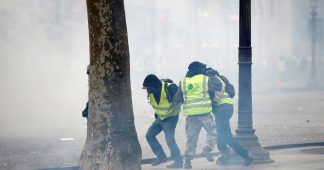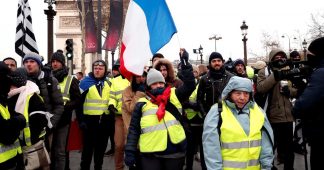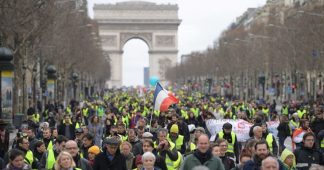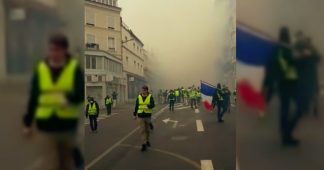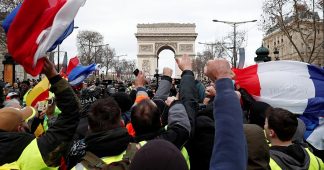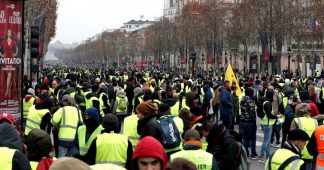3 April 2019
Tens of thousands of “yellow vests” demonstrators took part in the 20th weekend of protests across France last Saturday, following the announcement one week before that Operation Sentinel army soldiers had been authorized to shoot at them. They denounced Macron’s threats and the refusal of the government to respond to any of their demands against social inequality and the militarized police state. The Yellow Number Facebook page reported 102,000 protesters, while the government claimed only 34,000 demonstrated.
In Bordeaux, 5,000 protested, defying the police prefect’s ban and the declaration by the town hall that Bordeaux would be a “ghost town.” They marched to Place de la Victoire, where police fired upon them with tear gas. Several other cities saw large groups of “yellow vests”: 5,000 in Toulouse, 3,500 in Saint-Etienne, 2,000 in Epinal, and 1,000 in Lyon. In Avignon, the police took control of the gates of the old city walls to limit access to the town center.
Several hundred “yellow vests” rallied in Nice to protest against the violent attack on the 73-year-old Geneviève Legay by security forces the previous week.
In Paris the police counted 4,000 protesters. Following the threats by the military and amid an ongoing struggle by the Algerian working class and youth to overthrow the hated military-backed regime, WSWS reporters noted an increasingly thoughtful and determined atmosphere among many demonstrators, aware of the historical stakes of these struggles.
Beatrice spoke about the development of the protests since the first mobilizations against Macron’s planned regressive petrol taxes. “We realized that it was not only the problems of taxation. We saw a lot of things that were wrong. There is a problem of purchasing power in every profession. We saw all the money squandered by the government.” She expressed the hope that “we will finally restructure France. Our governors have been failing for more than 40 years.”
She expressed her solidarity with protests in Algeria and said she hoped soldiers would disobey orders to fire on protesters in France: “If it comes to civil war it would be horrible. But in any case, democracy in France already has already greatly deteriorated.”
While noting that some police wear yellow badges and show their solidarity with the movement when protesters question them, she also opposed the violence carried out by the police: “There are some who love to hit,” she said. “You see me. I am not violent. I am nothing at all. But there are some [police] who are crazy, and I will say, among the Anti-Criminal Brigade (BAC) some that one would think are in militia. … We see people arrested, handcuffed and then they are beaten on the ground. Once you have taken control of someone, you stop. After that it becomes a form of torture.”
Beatrice, who works as a secretary, also expressed her deep distrust for the trade unions, which broke the truckers’ strike as the “yellow vests” movement began. She explained, “We know the unions are bought… There was the heavy truck strike at the beginning of the movement. The government immediately brought in the unions and right away, it was: ‘Shut up, take what you are given.’ After that the truckers were bound hand and foot. They told us, ‘we no longer have to strike because the union negotiated.’”
Beatrice also spoke about her grandparents, who were members of the French Communist Party (PCF) during the Second World War and knew deportees. Asked about the role of the PCF today, she said, “They do nothing, that is clear. When I was young, I was involved… But I do not see any party fighting against capitalism.” As for a fight today against capitalism, she added, “that remains the goal.”
The WSWS also spoke to Bastien and Agnès, both members of Unsubmissive France, the party of Jean-luc Melenchon. Bastien called for a Citizens’ Initiative Referendum (RIC) and pointed to “the strong demand for social equality. For example, we can see that the fortune tax and the cuts to housing subsidies and the lowering of housing subsidies have not been passed.” Referring to the struggle of workers and young people to bring down the Algerian military dictatorship, he added: “I think it is beautiful. The young people are committed to defending democracy.”
Asked about Macron’s decision to authorize the army to fire on “yellow vests,” Bastien said, “The bourgeoisie has always been more with Hitler than the Popular Front. We can see that even in Brazil: Bolsonaro was elected with the support of the liberals. In the end, the bourgeois liberals accommodate themselves very quickly with restrictions on public liberties and an authoritarian capitalism.”
He also noted the discrediting of the trade unions and established political parties of their role in defeats of workers’ struggles. “There are party interests or unions that take precedence over the interests of workers. They are there to win elections, and put the struggles afterwards.” Asked about the financing of the union apparatus by employers and the state, he reacted: “It’s clear there is a significant risk when the government is funding them.”
Victor expressed his support for the protests: “We want greater purchasing power. I’ve been unemployed for a year. I’m a printer and was making 1,900 euros per month after taxes. For the same job now I’ll be offered 1,400 to 1,500. The fall in wages has been huge. I’m 56. I’ve committed to buying a home, and now find myself needing 300-400 euros extra by the 10th of the month because I have to pay my bills.”
Victor said workers can no longer rely on unions to defend themselves. “I do not have a very high opinion of them, since they are subsidized by the government,” he said. “They’re not the unions of before… The general secretary [Philippe Martinez] of the CGT labelled the Yellow Vest protests as a fascist movement.”
“Being subsidized [by the government] means a lot,” he added. “I don’t think it’s healthy. They say they defend workers but they are paid by the state or the employers.”
He said that Macron’s threats would not intimidate the movement: “He’s playing on fear. The armored cars have not stopped us. All the names we’ve been called: fascists, anti-Semites, maybe soon pedophiles as well… Although the latest trend is the label of a terrorist. I saw a riot police officer armed with a military-grade weapon. I asked him why he had it. He pointed to a young man who had dismantled the scaffolding from a roadblock on a Paris street, and said: ‘He is a terrorist.’ I really do not have the same vision of terrorism.”
Responding to Macron’s declaration last year that the fascist dictator Petain, who headed the Vichy regime under Nazi occupation, was a great soldier, Victor drew parallels with the present day. “Where are we going today? When there were wars in the past, political opponents were slaughtered in the streets or were simply imprisoned or disappeared… The Vichy police deported the Jews and political opponents. What interests me is that at that time, the Resistance fighters were also labelled ‘terrorists’ at the time.”
Published at https://www.wsws.org/en/articles/2019/04/03/yell-a03.html
